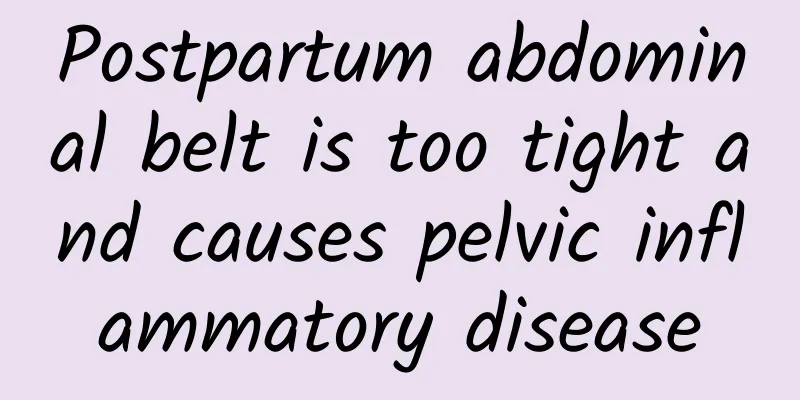Postpartum abdominal belt is too tight and causes pelvic inflammatory disease

|
Meili is a young new mother whose baby is just one month old. Meili has recovered her figure well, and her weight is only 5 kg more than before giving birth. Meili is quite satisfied. But she feels depressed when she looks at her bloated waist and loose fat in the mirror. On the recommendation of her good sister, Meili used a tight belly belt to tighten her waist and abdomen. When she stood in front of the mirror, she was really different, with a waist and hips. Meili became obsessed with belly belts, and adjusted them tighter and tighter, so that her figure could be comparable to that before giving birth. But the good times did not last long. After using the belly belt to tighten herself for 3 days, Meili found that she was weak all over, had a fever, sweated, had severe pain in the lower abdomen, felt like falling, and had back pain. There was also a lot of bloody leucorrhea on her underwear, and it smelled bad. Meili felt that the situation was serious and rushed to the hospital for treatment. The doctor examined Meili and found that a large amount of dirty, bloody and smelly secretions were leaking out of the cervix through the speculum. The cervix was painful when she lifted it during the bimanual examination. The uterus was swollen and soft due to congestion and edema, and there was obvious tenderness. The blood routine examination showed a significant increase in the total number of white blood cells and neutrophils. Combined with the fact that Meili had recently used a tight belly band, the doctor diagnosed her with acute pelvic inflammatory disease. She needed to be hospitalized immediately for treatment. After admission, she was given intravenous antibiotics, fluids were replenished, and her vulva was cleaned. After 3 days of treatment, Meili's body temperature returned to normal, and the pain and falling of her lower abdomen also improved. The doctor told Meili that after giving birth, the uterus will gradually return to its original position, and the loose abdominal wall formed after delivery will mostly recover naturally within 6 to 28 weeks after delivery. Tight abdominal belts not only fail to reduce weight, but may also cause many harms to the body. The use of abdominal belts by pregnant women will increase abdominal pressure, which not only affects wound healing, but also easily causes pelvic inflammatory disease. After giving birth, you should actively strengthen exercise, eat a scientific diet, and insist on breastfeeding. Breastfeeding can not only promote uterine recovery, but also help to shape your body. |
>>: Patients with pelvic inflammatory disease should pay attention to the hygiene of underwear
Recommend
Get rid of back fat! Do 4 wall stretches quickly
★Use the wall to do shrimp pose Step 1: After sta...
How to take preventive measures against cervicitis at home
Cervicitis is a disease that many people suffer f...
What are the daily precautions for uterine effusion?
Uterine effusion is a relatively common gynecolog...
Health Guide: Eating chocolate in moderation during menstruation can help relieve menstrual cramps
Every month when your period comes, you have to t...
How to prevent dysmenorrhea in women!
Many friends are troubled by dysmenorrhea. How to...
Do you still have physical needs after menopause?
Postmenopausal women still have physical needs, a...
Obvious clinical manifestations of vulvar leukoplakia
Vulvar leukoplakia is a common gynecological dise...
Is dysmenorrhea related to prostate hormones?
Dysmenorrhea is closely related to prostate hormo...
What to do if abortion syndrome occurs during abortion
The occurrence of abortion syndrome is the result ...
Causes of Acute Bartholinitis
Acute Bartholinitis is an inflammation caused by ...
What are the best treatments for cervical hypertrophy?
In recent years, there are more and more patients...
Can you lose weight by eating oatmeal every day? Beware of ketoacidosis
Artists may need to lose or gain weight for a rol...
What causes cervical erosion in women? Women should understand what uterine erosion is.
Gynecological diseases are a common female diseas...
How can women recover faster after abortion? Four nursing principles for women after abortion
How can women recover faster after an abortion? A...
What are the typical symptoms of patients with cervical erosion?
What are the typical symptoms of patients with ce...









